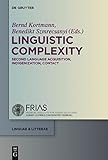Linguistic Complexity : Second Language Acquisition, Indigenization, Contact / ed. by Bernd Kortmann, Benedikt Szmrecsanyi.
Material type: TextSeries: linguae & litterae : Publications of the School of Language and Literature Freiburg Institute for Advanced Studies ; 13Publisher: Berlin ; Boston : De Gruyter, [2012]Copyright date: ©2012Description: 1 online resource (264 p.)Content type:
TextSeries: linguae & litterae : Publications of the School of Language and Literature Freiburg Institute for Advanced Studies ; 13Publisher: Berlin ; Boston : De Gruyter, [2012]Copyright date: ©2012Description: 1 online resource (264 p.)Content type: - 9783110229219
- 9783110229226
- 401.93 22/ger
- P128.C664 L34 2012
- online - DeGruyter
- Issued also in print.
| Item type | Current library | Call number | URL | Status | Notes | Barcode | |
|---|---|---|---|---|---|---|---|
 eBook
eBook
|
Biblioteca "Angelicum" Pont. Univ. S.Tommaso d'Aquino Nuvola online | online - DeGruyter (Browse shelf(Opens below)) | Online access | Not for loan (Accesso limitato) | Accesso per gli utenti autorizzati / Access for authorized users | (dgr)9783110229226 |
Frontmatter -- Table of Contents -- Preface: A closer look -- Introduction: Linguistic complexity -- Accounting for analyticity in creoles -- Nothing will come of nothing -- Deletions, antideletions and complexity theory, with special reference to Black South African and Singaporean Englishes -- The complexity of the personal and possessive pronoun system of Norf ’k -- Interlanguage complexity -- Complexity as a function of iconicity -- Acquisitional complexity -- Syntactic and variational complexity in British and Ghanaian English -- Complexity hotspot
restricted access online access with authorization star
http://purl.org/coar/access_right/c_16ec
Linguistic complexity is one of the currently most hotly debated notions in linguistics. The essays in this volume reflect the intricacies of thinking about the complexity of languages and language varieties (here: of English) in three major contact-related fields of (and schools in) linguistics: creolistics, indigenization and nativization studies (i.e. in the realm of English linguistics, the “World Englishes” community), and Second Language Acquisition (SLA) research: How can we adequately assess linguistic complexity? Should we be interested in absolute complexity or rather relative complexity? What is the extent to which language contact and/or (adult) language learning might lead to morphosyntactic simplification? The authors in this volume are all leading linguists in different areas of specialization, and they were asked to elaborate on those facets of linguistic complexity which are most relevant in their area of specialization, and/or which strike them as being most intriguing. The result is a collection of papers that is unique in bringing together leading representatives of three often disjunct fields of linguistic scholarship in which linguistic complexity is seen as a dynamic and inherently variable parameter.
Issued also in print.
Mode of access: Internet via World Wide Web.
In English.
Description based on online resource; title from PDF title page (publisher's Web site, viewed 28. Feb 2023)


